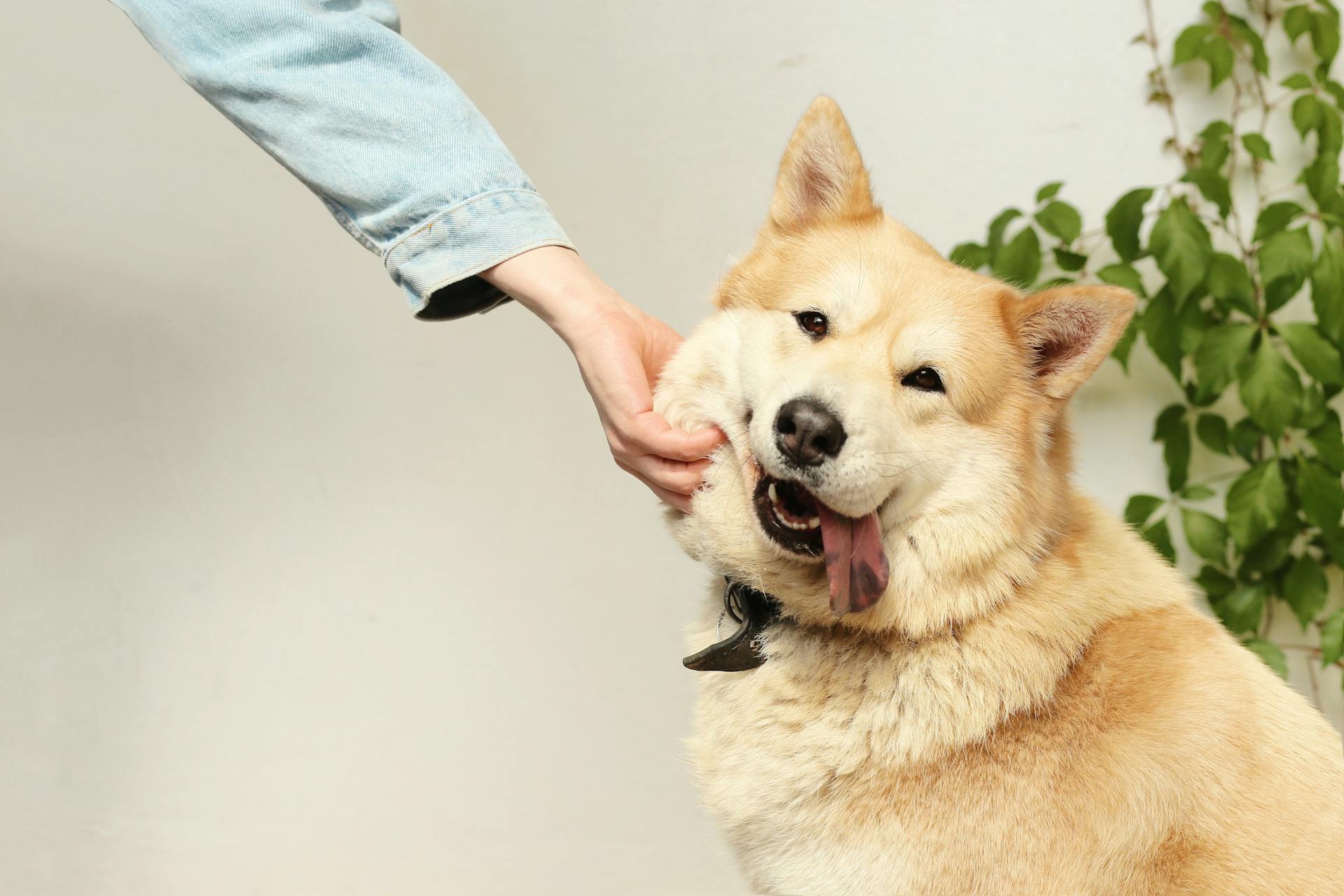
As a Bernedoodle owner, you want to ensure your furry friend lives a long, happy, and healthy life. Unfortunately, like all breeds, Bernedoodles can be prone to certain health issues.
Hip dysplasia is a common concern, as it can lead to arthritis and mobility problems later in life. This is because Bernedoodles can inherit the condition from their Poodle or Bernese Mountain Dog parent.
Eye problems, including cataracts and progressive retinal atrophy, are also potential issues. These conditions can cause vision loss and blindness if left untreated.
Genetic testing can help identify potential health risks in Bernedoodles. This allows breeders to make informed decisions when breeding and owners to be aware of potential issues.
Readers also liked: Bernedoodle Behavior Problems
Health Issues
Health issues can be a concern for Bernedoodle owners, but understanding the risks can help you prepare and take preventative measures. Bernedoodles are considered healthier than their purebred parents, but they can still inherit conditions from both sides of their DNA.
Some common health issues in Bernedoodles include hip dysplasia, elbow dysplasia, eye conditions, and skin issues like allergies and hot spots. These conditions can be inherited from their parent breeds, and proper diet and exercise can help prevent them.
A DNA kit can help identify potential genetic health problems in your Bernedoodle, and regular veterinary check-ups can catch any issues early on. Treatment options vary depending on the condition, but may include chiropractic therapy, supplements for joints, anti-inflammatory medications, and surgery.
Here are some estimated costs for common Bernedoodle health issues:
It's essential to work with a reputable breeder who screens for health conditions and provides a complete health history for your puppy and their parents. By being aware of the potential health issues and taking preventative measures, you can help ensure your Bernedoodle lives a long and healthy life.
Degenerative Myelopathy
Degenerative Myelopathy is a serious health issue that affects Bernedoodles. This disease is characterized by progressive loss of muscle tone and increased weakness in the hind limbs of dogs.
The symptoms of Degenerative Myelopathy can be quite debilitating, making everyday activities a challenge for affected dogs. It's heartbreaking to see a beloved pet struggle with such a condition.
Currently, there is no treatment available for Degenerative Myelopathy, leaving owners with limited options to manage their dog's symptoms. This can be a significant burden for many families.
The diagnosis of Degenerative Myelopathy can be quite expensive, ranging from $2,000 to $4,000. This is a significant financial investment for many pet owners.
Heart Disease
Heart disease can be a serious issue for some breeds, including Bernedoodles.
Heart disease is a general term that sums up any heart or blood vessel related issue.
Treatment costs can vary depending on the exact problem that was diagnosed.
Thyroid Issues
If you're a Bernedoodle owner, you might be concerned about thyroid issues, which can affect your furry friend.
Thyroid issues in Bernedoodles can be treated with medication that replaces depleted thyroid hormone.
The original diagnosis for thyroid issues can cost between $50-$150.
Monthly medication to treat thyroid issues can cost between $20-$50 a month.
Discover more: How Much Does It Cost to Groom a Bernedoodle
Luxating Patella
Luxating Patella is a serious health concern for Bernedoodles. It's a dislocated knee that requires prompt medical care.
Surgery is often necessary to correct the issue, and it can be costly, with prices ranging up to $3,000. This is a significant expense, but it's essential to address the problem to prevent chronic pain.
There are four stages of patellar luxation, and unfortunately, the worst stage can't be fully corrected. This means that some Bernedoodles may experience ongoing discomfort.
If you suspect your Bernedoodle has a luxating patella, it's crucial to seek veterinary attention right away. Early detection and treatment can make a big difference in their quality of life.
Here are the four stages of patellar luxation:
Sebaceous Adenitis
Sebaceous Adenitis is a serious skin condition that affects Bernedoodles. It targets the skin glands that secrete oils and help with immune function.
The Poodle, a parent breed of the Bernedoodle, is particularly prone to this disease. This means Bernedoodles may be at risk as well.
You might like: Bernedoodles and Goldendoodles
Inflammation and destruction of the skin glands can lead to scaly skin and matted fur. Medicated shampoos are often recommended to help manage the condition.
These shampoos can be pricey, costing anywhere from $30 to $50. Regular use of medicated shampoos can help alleviate symptoms.
To prevent dry skin, it's essential to bathe your Bernedoodle only when necessary, ideally no more than once a month.
Bloat
Bloat is a serious health issue that can be life-threatening for Bernedoodles. It's a medical emergency that requires immediate attention.
Bloat causes the stomach to twist, trapping air, fluid, and food within the stomach. This results in a dangerously high pressure within the stomach.
This pressure expansion can be so severe that it pushes on other body parts, restricting blood flow to the heart, stomach, and lungs. This can lead to necrosis of those organs.
Death from bloat can occur within hours if left untreated. Emergency veterinary care can be lifesaving if caught early enough.
Surgery can fix this issue, but it can be costly, with prices ranging up to $7,500.
Breed Overview
The breed's size can impact its lifespan, with standards typically living 12 to 17 years.
Their active nature requires regular exercise to stay happy and healthy.
Standard-sized dogs can weigh anywhere from 50 to 90 pounds, while miniatures range from 25 to 49 pounds, and tiny dogs tip the scales at 10 to 24 pounds.
Their intelligence makes them great candidates for obedience training and mental stimulation.
These dogs are known for their variable coat types, often described as wavy to curly.
Their coat colors are just as diverse, with black, black and white, black and brown, and tri-color being the most common.
You might like: Black Mini Bernedoodle
Clinical Signs
One of the most concerning health issues that can affect Bernedoodles is degenerative myelopathy, a progressive disease that causes loss of muscle tone and increased weakness in the hind limbs.
The symptoms of degenerative myelopathy can be quite telling, including lethargy, decreased range of motion, and difficulty or reluctance in climbing stairs, rising, jumping, or running.
As the disease progresses, you may notice a loss of muscle mass in the thighs and noticeable enlargement of the shoulder muscles.
If you suspect that your Bernedoodle is suffering from degenerative myelopathy, it's essential to seek veterinary care right away, as there is no treatment available for this condition, and the diagnosis alone can cost between $2,000-$4,000.
Here are some of the clinical signs to look out for:
- Lethargy
- Decreased range of motion
- Difficulty or reluctance in climbing stairs, rising, jumping, or running
- Loss of muscle mass in the thighs
- Noticeable enlargement of the shoulder muscles
- Flinching when the lower back muscles are touched
Common Problems
Bernedoodles can inherit health issues from their parent breeds, Bernese mountain dogs and poodles. Both breeds are prone to bloat, which can be fatal if not treated promptly.
Some common health problems in Bernese mountain dogs include cancer, hip and elbow dysplasia, eye diseases, cardiac disease, hypothyroidism, autoimmune diseases, and von Willebrand disease. These conditions can cause a range of symptoms, from pain and difficulty moving to blindness and sudden death.
Bernedoodles can also inherit eye diseases, such as entropion and ectropion, from their Bernese mountain dog parents. These conditions can cause the eyelids to roll in or out, leading to discomfort and vision problems.
Explore further: Bernese Mountain Dog Issues
Responsible breeders test their adult dogs for genetic diseases before breeding them together. They should also offer a health guarantee on their puppies in case they develop a genetic disease later in life.
Here are some specific health issues that can affect Bernedoodles:
- Cancer, such as malignant histiocytosis (MH)
- Hip and elbow dysplasia
- Eye diseases, including entropion and ectropion
- Von Willebrand disease
- Bloat (gastric dilatation-volvulus)
- Idiopathic epilepsy (a neurological disease that causes seizures)
- Sebaceous adenitis (a hereditary skin disease that causes hair loss)
- Legg-Calve-Perthes disease (a congenital hip joint disorder)
- Luxating patella (a condition that causes the kneecap to slip out of place)
Prevention and Care
Proper diet and exercise are crucial for preventing health issues in Bernedoodles. A well-fed and exercised Bernedoodle can live a long and healthy life.
Obesity is a significant contributor to many Bernedoodle health problems. By keeping your Bernedoodle at a healthy weight, you can reduce the risk of hip dysplasia and other issues.
To maintain your Bernedoodle's health, make sure to clean their ears after swimming, and check their eyes regularly for any signs of irritation or changes in vision.
Here are the different Bernedoodle sizes and their expected lifespan:
Pet Care
When choosing a pet, consider the space you have available. A Standard Bernedoodle can weigh 61–100 pounds and stand up to 29 inches tall, making them a large breed that requires ample space to move around.
If you live in a small apartment, Toy and Miniature Bernedoodles might be a better fit, as they weigh 20-45 pounds and stand up to 22 inches tall. However, all Bernedoodles need regular exercise to stay happy and healthy.
To determine the right size of Bernedoodle for you, consider your lifestyle and the amount of space you have available. Here's a quick size guide to help you decide:
Regardless of size, all Bernedoodles need regular exercise and attention to stay happy and healthy.
Choose a Reputable Breeder
Choosing a reputable breeder is crucial to ensure your Bernedoodle's health. You should research thoroughly to find a quality, ethical breeder.
A reputable breeder will have done their due diligence in breeding healthy dogs, greatly reducing the risk of hereditary conditions. This is a significant concern, as supporting bad quality breeders can lead to serious health issues for your puppy.
Don't just choose the first breeder that pops up, take your time to find one that prioritizes the health and well-being of their dogs. A good breeder will be transparent about the health of their dogs and provide you with all the information you need to make an informed decision.
Preventing Issues through Diet & Exercise
Proper diet and exercise are essential for preventing health issues in Bernedoodles. By keeping your Bernedoodle lean, you can prevent joint disorders like hip dysplasia and elbow dysplasia.
Feeding your Bernedoodle measured meals twice a day, rather than free feeding, can help maintain a healthy weight. This is especially important for Standard Bernedoodle puppies that may grow to be giant-sized by adulthood.
A well-exercised Bernedoodle can happily fit into most families, regardless of size. With regular exercise, you can prevent obesity, which is a contributing factor in many Bernedoodle health issues.
Here's a breakdown of the exercise requirements for different Bernedoodle sizes:
By understanding the specific exercise needs of your Bernedoodle, you can help prevent health issues and ensure a happy, healthy life for your furry friend.
Prevention and Care
Bernedoodles are a hybrid breed, and as such, they don't have an official breed standard, which means their appearance and temperament can vary greatly.
If this caught your attention, see: Bernedoodle Breed
If you're considering bringing a Bernedoodle into your family, it's essential to understand that they may not look like either parent breed. Some Bernedoodles may have a low-shedding or non-shedding coat, especially if they're 25% Bernese mountain dog and 75% poodle.
Be aware that Bernedoodles may experience health conditions, but it's not specified what those conditions are in the article.
To ensure the health and well-being of your Bernedoodle, it's crucial to work with a reputable breeder who prioritizes the health and temperament of their dogs.
Since Bernedoodles can have variable coat types, regular grooming is essential to prevent matting and tangling.
You might enjoy: Heat and Dogs Not Eating
Nutrition and Grooming
Feeding your Bernedoodle a complete and balanced diet is crucial to their overall health. Look for dog food approved by the Association of American Feed Control Officials (AAFCO) to ensure they get the nutrients they need.
Free feeding can lead to overeating and weight gain, which can exacerbate joint disorders and weight-related health problems. Feed measured meals twice a day instead.
Bernedoodles are a low-shedding breed, but they still require frequent brushing and regular grooming sessions with a professional. Daily teeth brushings with doggy toothpaste can help prevent plaque buildup and keep their teeth healthy.
Expand your knowledge: Mini Bernedoodle Full Grown Weight
Grooming Guide
The Bernedoodle's grooming needs are a crucial part of their overall health.
The Bernedoodle is a low-shedding breed, which means they require frequent brushing to prevent matting and tangling of their fur.
Regular grooming sessions with a professional are also a must, as they help to keep their coat in top condition.
Daily teeth brushings with doggy toothpaste are essential to prevent plaque buildup, just like with any dog.
A regular oral hygiene regimen, including frequent teeth brushing, can help prevent a multitude of Bernedoodle health issues.
This may add a few minutes to your Bernedoodle's routine, but it's totally worth it to prevent potential health problems.
Suggestion: Grooming Bernedoodle
Nutritional Tips
Feeding your Bernedoodle a dog food approved by the AAFCO is essential for a complete and balanced diet. This ensures your canine companion gets all the necessary nutrients.
Talk to your vet about which brand is best for your dog, as they can provide personalized recommendations.
Feeding your Bernedoodle measured meals twice a day is a great way to maintain a healthy weight and prevent joint disorders. Free feeding, on the other hand, can lead to weight-related health problems.
To prevent joint disorders like hip dysplasia and elbow dysplasia, keep your Bernedoodle lean by controlling their food intake. This is especially important for Standard Bernedoodle puppies that may grow to be giant-sized by adulthood.
Feed food formulated for large-breed puppies to encourage slow and steady growth in your Bernedoodle.
For more insights, see: Best Dog Food for Bernedoodle
Skin Care
Bernedoodles require regular baths due to their love of being outdoors, but be sure to limit baths to no more than once a month to prevent dry skin.
Bathing them too frequently can strip their coat of its natural oils, leading to dryness and irritation.
A monthly bath is a good rule of thumb, and you can adjust the frequency based on their individual needs and activity level.
Ear Care
Bernedoodles are prone to ear infections if their ears aren't cleaned regularly, especially after swimming.
Cleaning your Bernedoodle's ears after a swim is crucial to prevent moisture and bacteria from accumulating. This can be done every time they're done splashing in water.
It's essential to clean their ears gently but thoroughly to avoid pushing wax further into their ears.
Frequently Asked Questions
What are the negatives of Bernedoodles?
Bernedoodles can exhibit stubbornness, overexcitement, and possessiveness, especially in their youth, but these behaviors often improve with age and training. With proper training, Bernedoodles can overcome these challenges and become well-behaved companions.
What do vets say about Bernedoodles?
Vets note that Bernedoodles can be prone to hip dysplasia, eye issues, and skin allergies, but responsible breeding practices can minimize these risks. Regular veterinary check-ups are essential to monitor your Bernedoodle's health and catch any potential issues early.
What is the life expectancy of a Bernedoodle?
Bernedoodles typically live between 12-16 years, depending on their size, with Standard Bernedoodles living slightly shorter lives than Mini Bernedoodles. Proper care and attention can help ensure your Bernedoodle lives a long and happy life.
Sources
- https://populardoodle.com/bernedoodle-health-issues-9-common-bernedoodle-health-problems-to-look-out-for/
- https://www.petmd.com/dog/breeds/bernedoodle
- https://centralillinoisdoodles.com/blog/pros-and-cons-of-bernedoodles-a-comprehensive-analysis/
- https://www.thesprucepets.com/bernedoodle-full-profile-history-and-care-5205278
- https://spotpet.com/breeds/dog-breeds/bernedoodle
Featured Images: pexels.com


